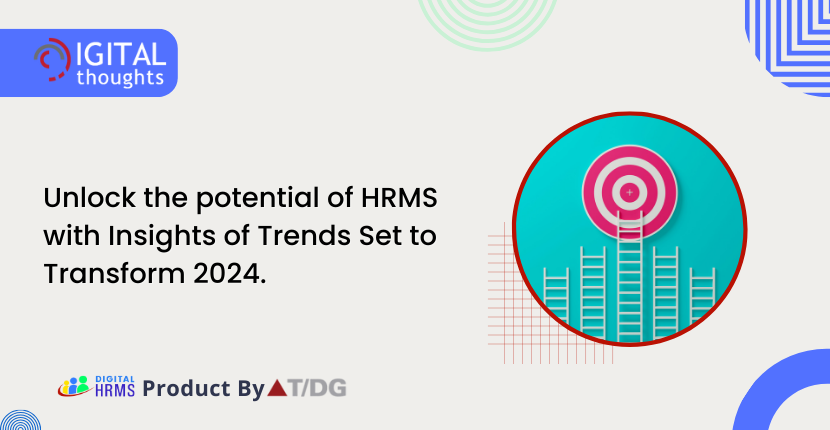Future-Ready HRMS: Trends Set to Transform Businesses in 2024

In the ever-evolving landscape of human resource management, the advent of Human Resource Management Systems (HRMS) has played a pivotal role in shaping the way organizations manage their workforce. As we delve into the intricate world of HRMS in 2024, it becomes evident that staying abreast of the latest trends is not just advantageous but essential for organizations aiming to thrive in the modern business environment. To unravel the prospective HRMS Trends we need to consider the following details -
Overview of HRMS Tool and Its Evolution
HRMS tool, a comprehensive software solution, has undergone a transformative journey from traditional personnel management to a sophisticated, technology-driven approach. Its evolution has been marked by the integration of various modules that streamline HR processes, from recruitment to employee engagement.

Importance of Keeping Up with HRMS Trends
The significance of staying informed about HRMS trends cannot be overstated. As technology advances and the workplace undergoes paradigm shifts, organizations must leverage the latest innovations in HRMS tool to enhance efficiency, employee satisfaction, and overall organizational success.
1: The Rise of AI and Machine Learning for HRMS in 2024
- Integration of AI for Smart Recruitment
In the realm of recruitment, Artificial Intelligence (AI) has emerged as a game-changer. Smart recruitment tools powered by AI can analyze resumes, predict candidate suitability, and even conduct initial interviews, streamlining the hiring process and saving valuable time.
- Machine Learning for Predictive Analytics
Machine Learning algorithms in HRMS solutions enable predictive analytics, providing insights into employee behavior, turnover patterns, and performance trends. This proactive approach empowers HR professionals to make data-driven decisions and implement preemptive measures as per the HRMS Trends.
2: Employee Experience Takes Center Stage
- Personalization in Employee Portals
Modern HRMS prioritizes personalization, offering employees tailored portals that cater to their unique needs. From accessing relevant information to personalized training modules, employees experience a more engaging and individualized interface.
- Enhanced Onboarding Processes
A key focus in HRMS trends is improving the onboarding experience. Through automated onboarding processes, organizations can ensure a seamless and efficient integration of new hires, fostering a positive and lasting impression.
3: Remote Work Revolutionizing HRMS Trends
- HRMS Tool Features Catering to Remote Work
The rise of remote work necessitates HRMS tool adaptations. Features like virtual collaboration tools, digital performance management, and online training modules have become integral in ensuring HRMS tools align with the needs of remote teams.
- Tools for Monitoring and Supporting Remote Employees
HRMS tools now include functionalities to monitor remote employee productivity, assess well-being, and offer necessary support. This shift acknowledges the importance of employee welfare beyond the physical workplace.
4: Data Security and Privacy for HRMS in 2024
- Increasing Concerns in Data Security
With the increasing reliance on HRMS in 2024, concerns about data security have heightened. Protecting sensitive employee information from cyber threats and unauthorized access is paramount.
- HRMS Solutions for Ensuring Privacy Compliance
To address data security concerns, modern HRMS tools incorporate robust privacy compliance features. This includes encrypted data storage, secure access protocols, and adherence to global data protection regulations.
5: Customization and Scalability in the HRMS Trends
- The Demand for Tailored HRMS Tools
Every organization is unique, and so are its HR requirements. The demand for customizable HRMS solutions allows organizations to tailor the system to their specific needs, ensuring optimal functionality and relevance.
- Scalability to Meet Evolving Business Needs in HRMS Trends
Scalability remains a key criterion in HRMS trends. Organizations, especially those experiencing growth, require HRMS solutions that can seamlessly scale to accommodate an expanding workforce and evolving business dynamics.
6: Integration with Other Business Systems
- Seamless Integration for Unified Workflows
Integrating HRMS with other business systems, such as ERP and CRM, ensures unified workflows. This synergy enhances overall organizational efficiency by minimizing data silos and streamlining cross-departmental processes.
- Benefits of Integrated HRMS Ecosystems
An integrated HRMS ecosystem offers numerous benefits, including real-time data synchronization, enhanced reporting capabilities, and a holistic view of organizational processes. This trend fosters collaboration and data-driven decision-making.
7: Employee Well-being and Mental Health Support
- HRMS Features Focused on Employee Well-being
Recognizing the importance of employee well-being, HRMS now includes features dedicated to monitoring and improving aspects such as stress levels, work-life balance, and overall job satisfaction.
- Mental Health Support Initiatives Through HRMS
Incorporating mental health support initiatives within HRMS demonstrates a commitment to employee welfare. Access to counseling services, stress management resources, and mental health awareness programs contribute to a healthier workplace culture.
8: Gamification in HRMS for Employee Engagement
- Gamified Training and Learning Modules
Gamification in HRMS training modules transforms learning into an engaging experience. By incorporating game elements, such as challenges, rewards, and friendly competition, organizations enhance employee engagement in continuous learning.
- Incorporating Gamification for Performance Recognition
Beyond training, gamification extends to performance recognition. Recognizing and rewarding achievements through gamified approaches fosters a positive and motivating work environment.
Conclusion
In summary, the landscape of HRMS is evolving rapidly, driven by technological advancements and changing workplace dynamics. As we navigate the trends of 2024, it becomes evident that embracing these innovations is not just a choice but a necessity for organizations aiming for sustained success. The need for continuous adaptation remains at the forefront, urging HR professionals to stay vigilant, informed, and proactive in adopting the latest HRMS trends.
Amidst these dynamic shifts, Digital HRMS emerges as the ideal solution poised to seamlessly incorporate the HRMS Trends and related facts. With its cutting-edge features, Digital HRMS empowers organizations to leverage AI and machine learning for smarter recruitment, enhance the employee experience, and adapt to the remote work revolution. Its commitment to data security, customization, scalability, and integration with other business systems positions Digital HRMS as the future-ready HRMS tool. By prioritizing employee well-being, mental health support, and gamification for engagement, Digital HRMS aligns with the transformative trends shaping the HRMS landscape in 2024. Embrace the future of HRMS Trends with Digital HRMS - your key to a technologically advanced and employee-centric HR management experience.
